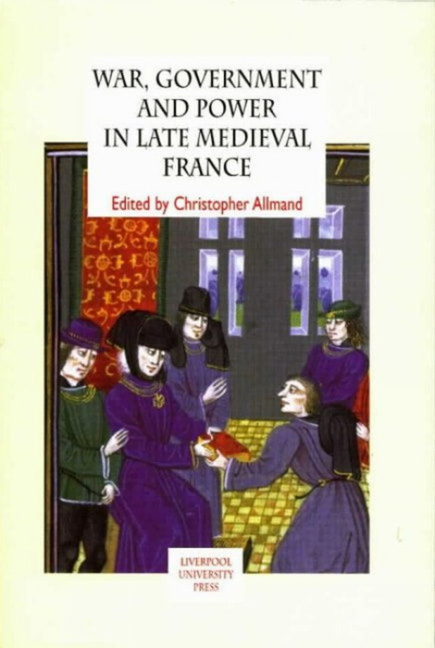Book contents
- Frontmatter
- Contents
- Dedication
- Acknowledgements
- Abbreviations
- Introduction
- 1 From the Court of Hainault to the Court of England: The Example of Jean Froissart
- 2 Froissart and his Second Book
- 3 Alain Chartier and the Arts of Crisis Management, 1417–1429
- 4 Intellectual Patterns and Affective Reactions in Defence of the Dauphin Charles, 1419–1422
- 5 War, Propaganda and Diplomacy in Fifteenth-Century France and England
- 6 History and the Literature of War: The Boke of Noblesse of William Worcester
- 7 Commynes on Kingship
- 8 ‘Centre’, ‘Power’ and ‘Periphery’ in Late Medieval French Historiography: Some Reflections
- 9 Centre and Periphery in Late Medieval France: Tournai, 1384–1477
- 10 ‘Decayed Feudalism’ and ‘Royal Clienteles’: Royal Office and Magnate Service in the Fifteenth Century
- 11 Justification and Theory of the Death Penalty at the Parlement of Paris in the Late Middle Ages
- 12 Membra disjecta of the Breton Chambre des Comptes in the Late Middle Ages: Treasures Revisited and Rediscovered
- Glossary
- Index
Introduction
- Frontmatter
- Contents
- Dedication
- Acknowledgements
- Abbreviations
- Introduction
- 1 From the Court of Hainault to the Court of England: The Example of Jean Froissart
- 2 Froissart and his Second Book
- 3 Alain Chartier and the Arts of Crisis Management, 1417–1429
- 4 Intellectual Patterns and Affective Reactions in Defence of the Dauphin Charles, 1419–1422
- 5 War, Propaganda and Diplomacy in Fifteenth-Century France and England
- 6 History and the Literature of War: The Boke of Noblesse of William Worcester
- 7 Commynes on Kingship
- 8 ‘Centre’, ‘Power’ and ‘Periphery’ in Late Medieval French Historiography: Some Reflections
- 9 Centre and Periphery in Late Medieval France: Tournai, 1384–1477
- 10 ‘Decayed Feudalism’ and ‘Royal Clienteles’: Royal Office and Magnate Service in the Fifteenth Century
- 11 Justification and Theory of the Death Penalty at the Parlement of Paris in the Late Middle Ages
- 12 Membra disjecta of the Breton Chambre des Comptes in the Late Middle Ages: Treasures Revisited and Rediscovered
- Glossary
- Index
Summary
The study of French history of the late Middle Ages has advanced on many fronts in the past generation. It has benefited from a growing under-standing of the variety of sources which contribute to a fuller appreciation of any country's history, how such sources may be used to best advantage, and from a growing discourse between specialisms which has led to a broadening of scholarly horizons. Some two-thirds of the chapters in the present collection have an important factor in common: they are concerned with contemporary works or writings which reflect the authors’ observations of, and usually their preoccupations with, the public life of late medieval France.
In recent years, the study of the historical work of Jean Froissart has been boosted by the publication of monographs and, significantly, by new editions of his chronicles. The chapter by Jean Devaux is mainly concerned to show how a chivalric culture common to the courts of both Hainault and England underlay the young Froissart's attempts to secure royal patronage, and then greatly influenced the nature of his historical writing. Froissart has long been regarded with some suspicion by historians of the fourteenth century as a writer with a great sense of occasion, whose skills of evocation were such that they cannot but impress the reader. Justifiably or not, Froissart's emphasis on the part played by the nobility, and on noble values and practices in war, together with his apparent lack of sympathy for those of lesser estate, has not made of him, in today's world, the most appreciated of writers on the fourteenth-century scene. In recent years, however, a move towards a better understanding of his work has led scholars to take an increasingly sympathetic view of Froissart's chronicles, which has meant trying to understand the man within the wider context of his poetic skills as well. The problems of editing his huge historical oeuvre are considerable: some of these are described in the chapter presented by Peter Ainsworth, in which he sets out the difficulties standing in the way of a modern critic who, asked to prepare an edition, has to decide what ‘Book II’ really is (or was), as well as other related problems of how to present the writings, many of them reworked long after they were originally composed, which Froissart left behind him at the end of an active working life.
- Type
- Chapter
- Information
- War, Government and Power in Late Medieval France , pp. xi - xviPublisher: Liverpool University PressPrint publication year: 2000



